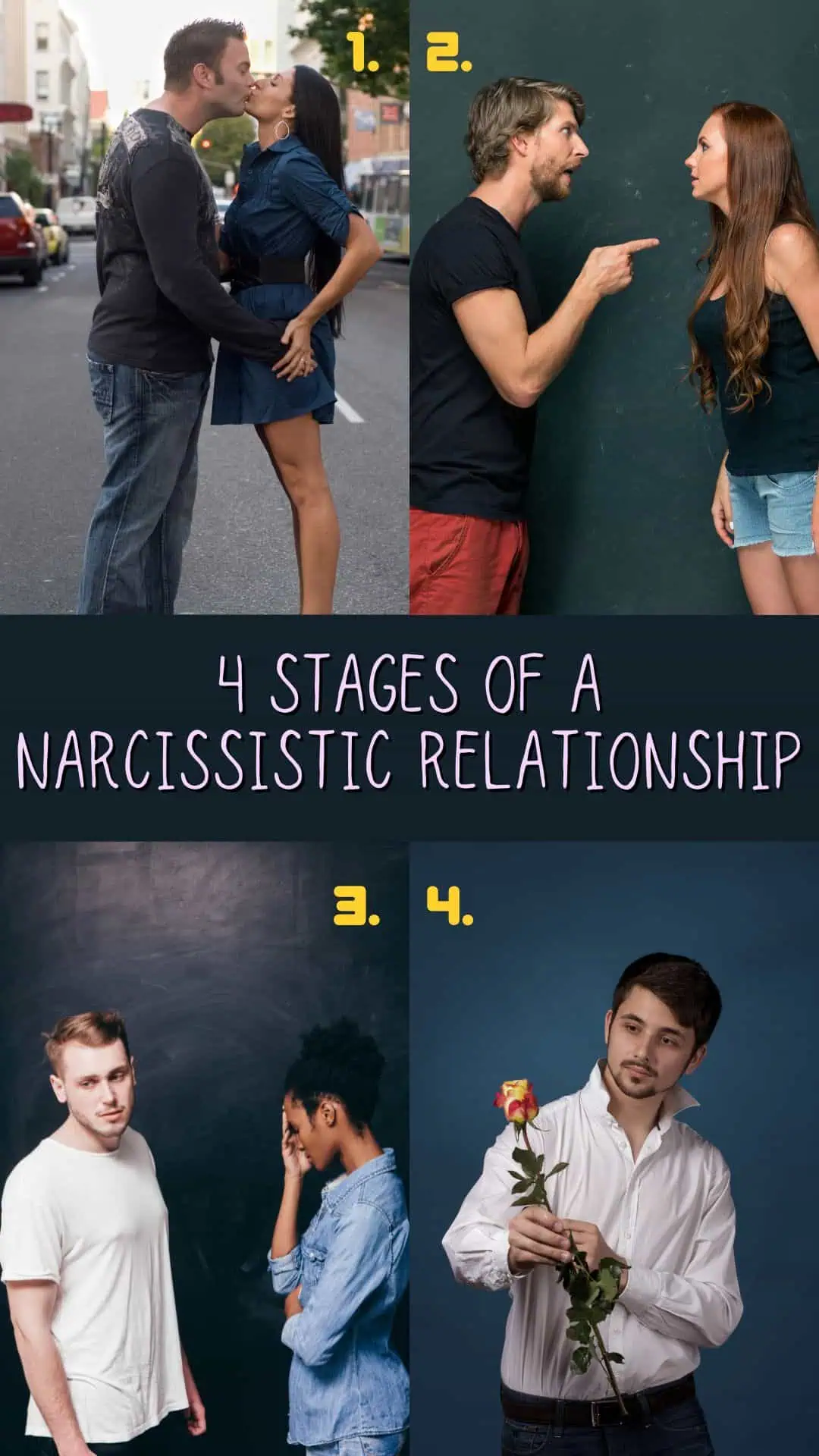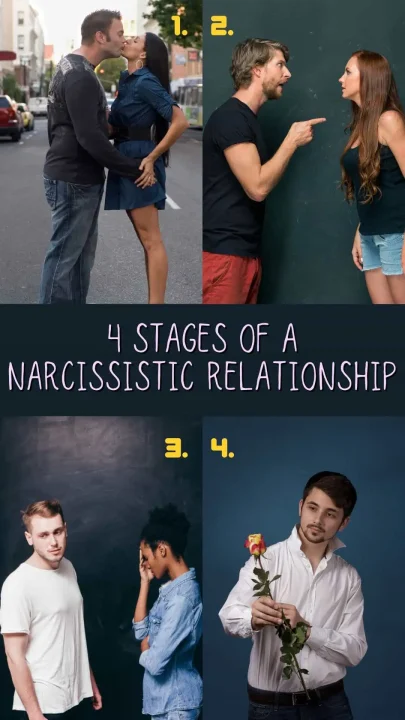Today's Thursday • 11 mins read
— Reviewed by Dr. Sandip Roy.
Each stage of narcissistic love is a manipulation. They can take you from feeling like you met the person of your dreams to how you could let this toxic person pair up with you.
People high on narcissism feel self-important, entitled to special treatment, and engage in ego-driven self-promotion.
A relationship with a narcissist is a constant battle. They keep trying to control you to feed their demands of narcissistic supply. And you keep trying to bargain out of giving in.
Psychologists Sedikides and Campbell say that narcissists create instability through waves of excitement, proposed reforms, and an inspiring vision.
Spot the stages of a narcissistic affair before they drain you mentally and emotionally. Secure your safety and well-being before the narcissist traps you forever.
The 4 Stages of A Narcissistic Relationship
Narcissists search for the perfect people to fall in love with.
They are attracted to trophy partners, whom they see as mirror images of their faultless selves and as a springboard for their own status (Grapsas, 2020, Seidman, 2016).
Here are the four stages or phases of a narcissistic relationship:

1. Idealization Phase: The Narcissist’s “Love-bombing”
The idealization phase of a narcissistic relationship can be deceptively exhilarating.
Nearly everything feels perfect in this phase. Your narcissist behaves as if you are their ideal and dream-come-true.
Your idealizing narcissist will tell you that you are so much better than they are. That they will never find anyone else more attractive, talented, or capable than you.
But in truth, they don’t value you as much as they claim. Read the research on the first stage of a love affair vs. narcissistic love:
- Early on in a relationship, people often see their romantic partner as better than themselves. This is called “partner enhancement.” This helps them handle disputes and disappointments better, expect less change from their partner, and have happier relationships.
- Researchers found that narcissistic people do not enhance their partners much at any stage of their relationship (Czarna & Śmieja, 2022).
- Narcissists instead manifest “self-enhancement.” That is, they evaluate themselves more favorably than their partner. As a result, they are likely to experience relationship dissatisfaction and face relationship dissolution (Morry et al., 2014)
They will go out of their way to make you happy and feel loved. They can use grand gestures to make it feel like a fairy tale.
This “love bombing” stage is when the narcissist tries to bind you inseparably with them. Their love, affection, and attention at this stage are all manufactured to manipulate you later.
“Narcissists are great con artists, and they know that when they first meet someone, they can make a good impression. As a result, they often attract people with their charm, only to later reveal their true colors.”
— Dr. Ramani Durvasula, Clinical Psychologist and Professor of Psychology
The control-seeking narcissist gives you the feeling that you are in control. They fulfill all your needs and desires. They buy expensive gifts, plan extravagant dates, and use their charm and charisma to win your heart.
The narcissist’s manipulative tactics during this stage are often so subtle that the other person falling for them may be completely unaware of what is happening.
They will also mirror you. Mirroring in psychology means copying someone’s actions or words to build rapport and understanding.
They will imitate your interests, values, desires, and body language. They know that mirroring can build trust, stir a deeper connection, and make you feel like you have met your soulmate.
To maximize your sympathy and compassion, they can paint themselves as victims of past relationships.

However, most narcissists cannot sustain this idealization phase. Once they have won you over, they lose interest in trying to impress you and end the idealization phase.
This is when they set the stage for the next phase in the relationship: devaluation.
2. Devaluation Phase: The Narcissist’s Tactic to Diminish and Control
The devaluation phase is a slow-growing, painful stage in a narcissistic relationship. This stage can gravely damage your self-esteem and mental health.
This is when the relationship takes a dark turn, and your once loving and attentive partner becomes increasingly critical, distant, and controlling. This is when they start their dominance and your victimhood.
Some truths from the research:
- Narcissists insult others more, no matter if they feel their ego is threatened or not. (Park & Colvin, 2015)
- Narcissistic personality disorder are condescending toward others (Rau, 2021).
- They even prioritize themselves over their close others (Tortoriello, 2017; Roberts, 2018).
- Narcissists feel that they contribute more to the relationship than their partners, and consider themselves more attractive and better than their partners (Campbell et al., 2002, Rohmann, 2011).
This devaluation phase marks the point when they indicate that they have had enough of trying to dance to your tunes and now want to be given the attention they believe they deserve.
- A very apparent sign in this phase is that they start to oppose and argue against at every chance.
- They constantly look for ways to belittle you, make your achievements seem useless, and gradually increase the frequency and intensity of their criticism and humiliation.
- They unleash their volley of negative remarks about your looks, sense of dressing, way of smiling, your intelligence, abilities, and even your family and friends, to severely dent your self-esteem.
- They then begin demanding that you conform to their wishes and preferences. They will want to approve what you wear, control how you talk to others, and even limit how happy you can be with others.
This toxic turn of the narcissist makes you afraid, thereby giving them more control of the relationship.
You start walking on eggshells around them, for they can humiliate you in any social situation. You are afraid to express your thoughts and opinions, as you might offend them.
They will often isolate you from your family, friends, and colleagues, so you won’t have anyone to talk to about your thoughts and ideas with.
You go through intense confusion, often wondering, “Is this the same person I fell in love with a few months back?”
They may start emotional withdrawal, become distant, cold, and unempathetic, and withhold their affection and emotional support.
You may bleed from an accidental cut, but they can look away.
Your narcissist may resort to giving you The Silent Treatment, meaning a complete stoppage of communication.
They stubbornly refuse to answer your calls and reply to your texts. And if they do, they respond in monosyllables.
They can behave like you don’t exist, even when you are in the same room.
Their constant criticism, emotional withdrawal, and controlling acts can damage your self-worth and self-confidence. Many victims go into a state of anxiety, panic, and depression.
Consult a therapist if you suspect the current spate of hurtful behavior is coming from a narcissist in the devalue phase. They can help you learn how to streamline your thoughts, build your self-worth, and cope with emotional trauma.

What makes a narcissist happy?
A narcissist is happy as long as you give them importance and praise, which feeds their pompous ego. Research says narcissism involves a strong need to maintain a grandiose self-image, and they meet this need through narcissistic admiration and narcissistic rivalry (Back et al., 2013).
“The narcissist will always be looking for that next hit of supply, and if it’s not coming from their partner, they will get it from somebody else. Narcissistic relationships are very much about keeping the narcissist’s ego inflated.”
— Dr. Karyl McBride, Marriage and Family Therapist, and Author of ‘Will I Ever Be Good Enough?’
3. Discard Phase: The Narcissist’s Act of Emotional Cruelty
The discard phase marks the end of a relationship with a narcissist, as decided unilaterally by the narcissist.
Most often, they reject you emotionally and psychologically before doing so physically. This whole distancing act is designed to leave you feeling abandoned.
They begin this phase by becoming emotionally detached from you and losing empathy for you.
They often intensify their rude behavior, leaving you feeling utterly worthless, hopeless, and helpless. Then they increasingly withdraw from you, blaming you for being overly sensitive.
They stop asking you for anything and often curse you under their breath, block out all communication, and seem to see through you when you are talking to them.
They may start spending more time away from you, working longer hours, or engaging in social activities without you.
They stop spending time with you, even walking off when you approach them.
All this can be extremely distressing, and you may feel intense mental pain trying to make sense of their radical shift in nature.
You may wonder, “How can he hate me so much?”
In the discard phase, the narcissist may begin to idealize a new partner.
They may speak highly of someone else or even start dating someone new while still being with you.
To make things more heart-wrenching for you, they will leave ways open for you to catch them cheating on you. When caught, they will blame you squarely, claiming it’s you who makes them feel replaced, discarded, and abandoned.

The discard phase is not always a sudden, dramatic event, but can be a slow process unfolding over months and years. By and by, they lose interest in you and in the relationship.
However, once the narcissist reaches this stage, they are unlikely to reconsider or attempt to resolve issues. They may simply ghost you, leaving you feeling blindsided and emotionally devastated.
“The hardest part about leaving a narcissistic relationship is that you often don’t realize you’re in one until it’s too late. They’re masters of manipulation, and it’s not until you’re completely enmeshed that you see the truth.”
– Shannon Thomas, LCSW, and Author of ‘Healing from Hidden Abuse.’
Surviving the discard phase requires strength, support, and self-care. Reach out to friends, family, or a counselor to help you process the grief and pain of the loss of the relationship.
Focusing on self-love and self-compassion, and rebuilding self-esteem, can help you get through this phase and move forward.
4. Hoovering Phase: The Narcissist’s Attempt to Regain Control
Hoovering is a manipulative tactic employed by narcissists to lure their former partners back into the relationship, aiming to reestablish contact and regain control over them.
If the narcissist’s new relationship fails, or they feel you are better than their current partner, or if they simply want to keep you as a second narcissistic supply, they may begin the hoovering phase.
During the hoovering phase, the narcissist may apologize, request you to re-partner, and restart their idealization phase.
They may send non-stop text messages, make many phone calls, show up unexpectedly at the ex-partner’s home or workplace, or send gifts.
They may also resort to guilt-tripping, manipulation, or threats to elicit a response from their former partner.
On a deeper look, the hoovering phase can be triggered by any perceived threat to the narcissist’s ego.
They may feel envious and insecure at their ex-partner moving on with their life, finding a new partner, or getting into a better situation instead of feeling abandoned or rejected.
Hoovering serves to get the narcissist a second chance to wield control and power over their former partner.
Experts advise victims of narcissistic abuse to set and enforce strict boundaries to resist their hoovering attempts, and, if possible, cut off all contact with them.
Engaging with the narcissist during the hoovering phase may make you feel in control, but it is a prelude to later manipulation and abuse.
Learn to respond to a narcissist’s hoovering attempts and avoid their traps.
“Narcissistic relationships are characterized by an excessive focus on the narcissist’s needs, often at the expense of the other person. Survivors of these relationships must learn to prioritize their own needs and well-being, which can be challenging after having been conditioned to cater to the narcissist’s demands.”
— Dr. Craig Malkin, Clinical Psychologist and Author of ‘Rethinking Narcissism.’
Final Words
Should you decline a narcissist during the hoovering phase, they initiate the vile treatment they reserve for an ex-partner. They can scar you emotionally, mentally, and even physically.
Keep these messages in mind:
- Always maintain strict personal boundaries at each phase of your relationship.
- Never let them isolate you from your support network of friends, family, and well-wishers.
- Unhesitatingly seek help from an expert counselor in NPD if you feel tormented in your relationship.
√ Also Read: Toxic Shame In Relationships: How To Know & Heal From It
√ Please spread the word if you found this helpful.
» You deserve happiness! Choosing therapy could be your best decision.
...
• Disclosure: Buying via our links earns us a small commission.
